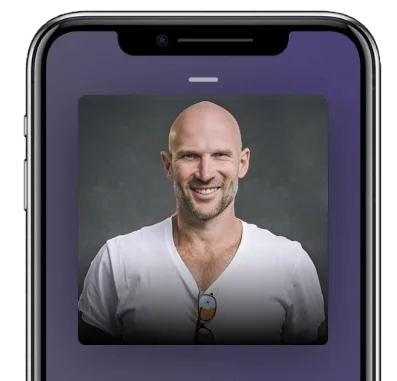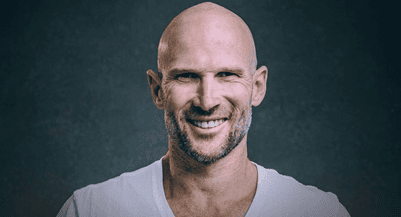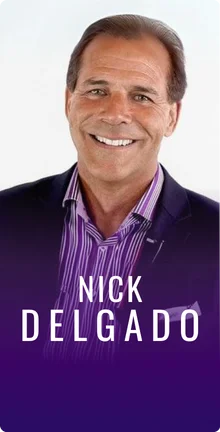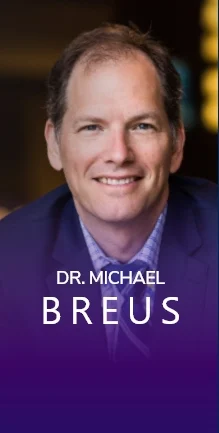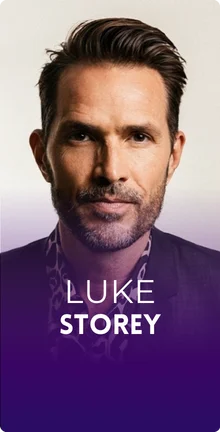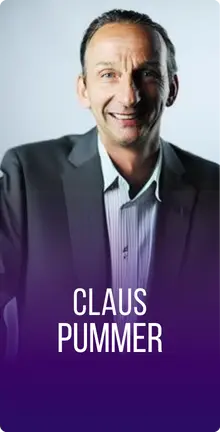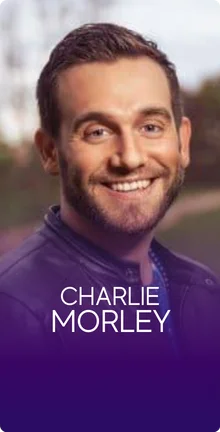James, it’s so great to have you on the show.
Stephan, great to be here, thank you.
What is it about sleep that keeps you up at night, that gets you really excited and wanting to focus so much of your energy on it?
Well, our whole life is dictated by how well or how poorly we sleep. It’s everything. We recover our muscles. We replenish the glucose in our brain in order for us to have clarity and focus the following day. It’s one of the most important things that human beings can do in order to live a happy healthy life. I focus on my sleep. I ensure that I get deep quality sleep. I ensure that I get the right duration of sleep. I ensure that I go to sleep at the right time and I wake up at the right time. Because of that, generally speaking, I live a very healthy life. I like to instill everything that I’ve learned in others and have created a sleep company called Swanwick…
Sleep is everything and it’s where we replenish the glucose in our brains, so we can have clarity and focus. It’s where we repair our muscles, that we’ve used throughout the day from standing up and sitting down and walking, potentially lifting weights in a gym. It’s where we feel calm. It’s where we learned patience. It’s really everything. It improves our skin if we’re sleeping effectively. If we don’t sleep effectively, then it’s drying out and aging our skin faster than what nature intended. I put the last five years and my focus into figuring out the best practices to sleep better and then have been sharing those with people who care to listen around the world via my sleep company, Swanwick Sleep, which develops a number of sleep products.
Very cool. Let’s talk about some of these best practices. You mentioned you optimize the duration and the time of your sleep and all sorts of things like that. What are some best practices around duration, around things to avoid, I’m guessing like not eating right before bed is probably a good strategy that sort of stuff?
Well, in my opinion, the biggest leverage point that you have with your sleep is to expose yourself to as much sunlight as possible during the morning and to block as much electronic, artificial lights at night. I’ll walk you through a perfect day to optimize your sleep, if you like.
As soon as you wake up in the morning, allow the natural sunlight of the sun to hit your skin, because our skin has receptors in it and when the sun hits your skin, it tells your body, “This is wake-up time.” Now about 12 to 16 hours later, your body knows what time your wake-up time was, he’s going to want to naturally start producing melatonin. Because you’ve exposed yourself to that sunlight first thing in the morning, at night time when the sun goes down, your body will start to naturally prepare to rest, prepare to sleep which will help you sleep faster, sleep deeper and ultimately wake up feeling nice and refreshed.
Our whole life is dictated by how well or how poorly we sleep. Share on XIf you can exercise in the morning. Studies show that people who exercise in the morning tend to sleep better. I think this is because of two reasons. One, because people who exercise in the morning tend to do it more regularly, because life doesn’t get in the way in the afternoon and you’re less likely to skip it and people who exercise more regularly tend to be healthier in general which leads to better sleep.
Two, because the optimal body temperature for sleeping is a cool body temperature. If you’re exercising close to bedtime your core body temperature will be higher, which is not conducive to a good night’s sleep. No caffeine after [2:00] PM. Coffee is a stimulant and even though you probably have a listener or listeners right now saying, “Well hang on, I drink a cappuccino at dinner every night and I sleep just fine.” Well, it may be true that you fall asleep just fine, but the quality of your sleep will be severely compromised if you have any level of caffeine in your system.
Avoiding alcohol after [2:00] PM will ensure optimal sleep conditions for you.
At night time, as you watch your TV shows, you brush your teeth in the bathroom light or you’ll scroll through your mobile phone, you are exposing yourself to artificial blue light that is tricking your brain and body into thinking that it is daytime, which means your body then does not produce the amount of melatonin that nature always intended for you.
You must block as much artificial light at night time in order to get a great night’s sleep. You can do that in a few different ways. You can wear a pair of blue light blocking glasses. I have a pair that I have produced name Swannies from by company Swanwick Sleep. There are other blue light blocking glasses companies on the market. You can download f.lux on your computer, which will strip away much of the blue light exposure. You can activate the twilight setting on your Android and the night shift setting on your iPhone which will again reduce the blue light exposure at night time. You want to sleep in a cool environment, so 18°C, 65°F–69°F has been shown to be the most optimal temperature to sleep in, to ensure a great night’s sleep.
If somebody is using, let’s say, night shift or the f.lux app on their computers, they’re still getting blue light exposure at night if they’re just using normal light bulbs and watching TV and stuff, right? You’re not solving the problem completely just by downloading the app.
You’re absolutely right. Downloading the app will give you about a 2 or a 3 out of 10 coverage. Let’s be generous, it gives you 3 out of 10 protection. It will do nothing about the light from your microwave, your bathroom light, your alarm clock light, your bedside table lights, the McDonald’s golden arches on the side of the road as you’re driving down the freeway, the traffic lights, the street lights. There is too much light at night and that light is destroying your sleep. The only way that I know of in the modern world, in the known universe is to protect your eyes with an orange lens that blocks out the amount of blue light responsible for disrupting your sleep.
Now, our glasses the Swannies blue light blocking glasses, block the blue light wavelength responsible for messing with your sleep and that’s up to 530 nanometers. A nanometer is what they used to gauge the wavelength of blue light. Yes, use your phone apps. Yes, use f.lux on your computer. Yes, dim the lights in your house if you like. Use special light bulbs, but nothing is as effective as just living your life by candlelight, in actual fact. If you at night time only lived by candlelight and only expose yourself to candlelight, that would ensure that you would have the best night’s sleep. However, it’s 2019 as we’re recording this, I know that’s unrealistic. People are going to use electronics. The best next thing you can do besides living in the dark and living by candlelight is to wear a pair of blue light blocking glasses.
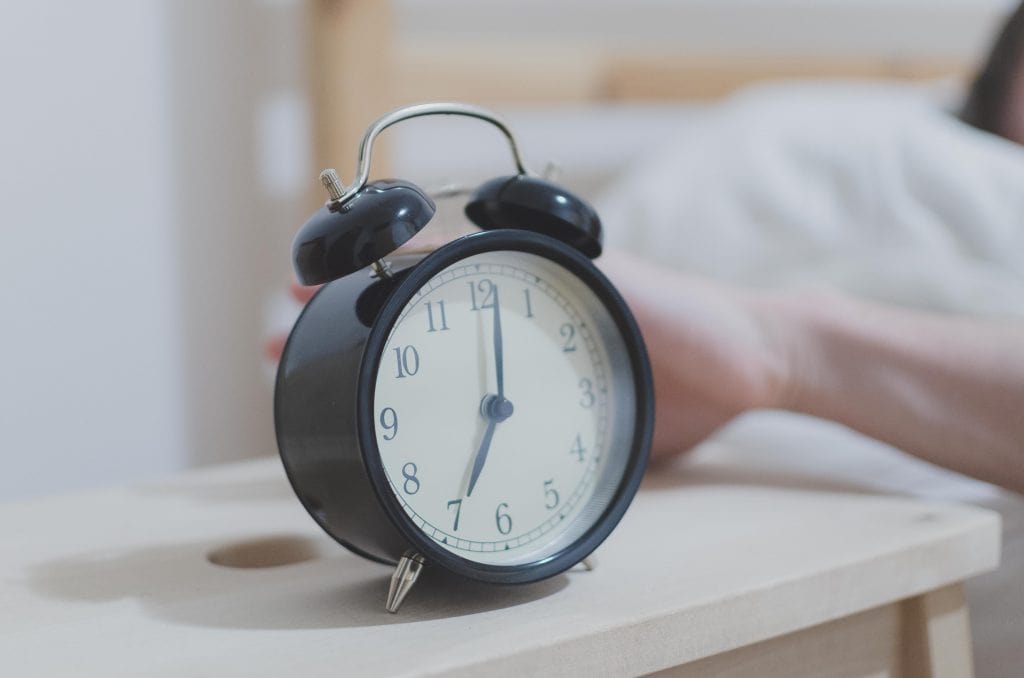
Do you need to wear these glasses during the day as well or just in the evening after the sun sets?
For sleep benefits, only in the evening. I wear mine in the last 45 minutes to an hour before I want to go to sleep and then I remove them once I’ve switched the final light off and then I roll over and go to sleep. I do wear them during the daytime when I’m on my computer for long periods, so it gives me temporary relief from eye strain from staring into a computer screen or on my phone for long periods throughout the day.
A lot of our Swannies users like to wear glasses as sunglasses. Well, you can wear them as sunglasses for stylish reasons. They will block out blue light, but ironically, you want as much blue light exposure during the daytime. The biggest emitter of blue light is the sun. We want the sun. We want the sun’s rays on us. It’s just really at night time, we don’t want the blue light.
What about different vitamins and supplements? Where do those fit into the equation here?
The biggest leverage point is light in my opinion. I’ve been doing this for a number of years. Look, I’ll walk through a couple of supplements that can certainly help but nothing is going to move the needle more with your sleep routine than exposing yourself to light first thing in the morning and blocking it at night. Everything else that we say after this is just kind of icing on the cake, but you really got to concentrate on the light issue.
Supplements, you’re asking about. Look, microdoses of melatonin can be helpful as one-offs. What I mean by that is you do not want to be popping melatonin supplements every single day because your body will become used to it. Your body will then stop naturally producing it on its own. It will become reliant on the oral version of the supplement of melatonin that you’re taking.
If you’re jet-lagged and it’s once every couple of weeks or special occasion and you really need to get to sleep, then take melatonin which will help you get to sleep better but do not do this consistently. It is not a long-term solution. It’s just a very short quick fix and studies have shown that if you pop it regularly, you’re going to become reliant on it and then your body will not naturally produce its own.
Magnesium has a very calming effect. You can take magnesium and what magnesium actually does is it relaxes the muscles in the body and just gives a calming and relaxing effect. A lot of people who take magnesium have said that it helps them calm down at the end of the day, it helps them prepare for sleep, and then ultimately they sleep better.
It helps you poop, too, apparently.
Okay. Those are the two main sleep supplements that come to mind. What I would say more than that though, even more important and more beneficial to your sleep is to be calm and as stress-free as you can throughout the day. There are a number of techniques to try to get your stress and anxiety levels down, but if your high on stress and high on anxiety, your sleep quality is going to be compromised as well. Ensuring that you live in an all-around healthy life, which is good nutrition, exercise, good relationships, doing anything you can to reduce stress and anxiety, whatever works for you, is going to help you sleep better at night, too.
Even if you live a healthy lifestyle, if high-quality sleep isn't part of the equation, all of your efforts are useless. Share on XGot it. Where does alcohol fit into this equation? Is it bad for sleep? Has it really no effect? Personally, I don’t drink but I’m curious if one of our listeners is a drinker and likes to enjoy a glass of wine maybe a couple of hours before bed, is that helpful or hurtful?
Hurtful. Alcohol is an abomination to our bodies. It’s awful and it does absolutely no good. The World Health Organization says there is absolutely zero benefit to any amount of alcohol. Especially within three hours of going to sleep. Just think about this for a second, let’s just say that you have a glass of red wine, which by the way, red wine and beer has the most number of toxins of any of the alcohols. The absolute worst drink you can have at the end of the night is red wine or beer, full of toxins. Having said that any alcohol is bad for you. It just is.
When you drink alcohol in the last three hours before you go to sleep, it is true that you may indeed fall asleep quicker because you had the alcohol, because alcohol creates this illusory temporary calming effect and people say, “I drink a glass of wine as part of my wind-down routine. It helps me get sleepy and then I fall asleep.” That may be true, but your sleep quality is severely compromised because now your liver is working hard to break down that alcohol. Your whole body is trying to get rid of the toxins. Your body cannot go into a deep state of rest because it has this foreign toxin in it.
The body, while you’re sleeping is working to get rid of these toxins and poison out of the system. You cannot be in a deep state of rest when that is happening. People are going to drink anyway. It doesn’t matter how many times I tell them not to do. They are going to do it. If you are going to do it, just know that only do it up to three hours before you want to go to sleep. Otherwise, you’re going to have a poor night’s sleep. It’s just the way it is.
The other thing I would say is the counter-argument I always hear from people around alcohol is like, “There are studies that show that a glass of wine a day is good for your heart and good for cardiovascular health.” That study has been debunked so many times now, it’s laughable.
If you just go on Google and google, “one drink a day good for cardiovascular health debunked,” even if you just remove the ‘debunked’ word, you’ll find dozens and dozens of articles that show just how preposterous that study is and was and has been. Let me reiterate it again, as someone who’s been coaching people on not drinking for many years from someone who hasn’t drunk in 10 years, there is no one amount of alcohol that has any benefit to you whatsoever.
Right. So, somebody who’s listening to that and says, “Well yeah, I knew that but I enjoy it. Just like some people enjoy Krispy Kreme donuts and they know that that’s not good for them but they’ll splurge.”
Then, you compromise your sleep and you compromise your looks because alcohol shows up in the skin and they’ve done studies that show that people who drink alcohol have up to 40% more visible crow’s feet and wrinkles on their faces and you pay the consequences that come with that. That’s fine. It’s a free world, your free will. Just drink, keep drinking your attractively packaged poison. It’s not a problem. I’m just telling you, I did not make the rules. God, the higher power, whoever created it—whoever that person is, he or she might—I’m just telling you what happens when you drink alcohol.
If you love it, you enjoy the taste, you feel like you needed to bond and connect with people, you love it as a way to celebrate or to calm down or whatever, you do it. Also, know that you screwing up your body in the process.
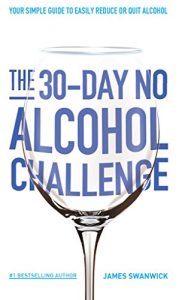
It comes with consequences. Tell me a bit more about how you ended up coaching people on dropping the alcohol. You actually have a book called the 30-Day No Alcohol Challenge. Let’s talk a bit about how that came about.
I grew up in Australia. It has a large drinking culture there and I was just a socially acceptable drinker, right up through my 30s until I was about 35. I’d have a couple of drinks each night, I’d have a few more on the weekends. I rarely got drunk but I drank regularly and consistently. I go over to friends dinner parties and bring bottles of wine and have some wine after work each day. I did that whole thing. Then, one day I woke up in 2010, I looked in the mirror, I just looked tired and weathered, and I was like, “James, just take a break.” Let’s see if we can go 30 days without drinking and just see what happens. I committed to 30 days without drinking.
It was quite challenging, but I got through. In 30 days, I lost 13 pounds of fat, my skin improved, I slept better. I landed my dream job hosting a TV show, SportsCenter on ESPN. I had clarity, I had focus, I had energy, I started running, I started concentrating on my nutrition a little bit more, and I thought, “Oh, this is pretty good. Maybe I’ll go for 40 days.” I went to 40 and then said, “Maybe I’ll go for 60 days,” I went 60 and so forth and so forth. I haven’t touched a drop of alcohol since. That was March 2010 when I quit. I literally haven’t touched one drop of alcohol since then.
It’s great, congratulations.
Thank you. In that time my whole life has transformed. Like I said, I got my dream job which was hosting SportsCenter on ESPN, I did that for two years. I’ve started two quite successful businesses. I have the body that nature intended me to have, which is lean, energetic and athletic. I got the energy to travel, I’m in my 40s now. I would put myself, at least, physically in the top 1% of 40-somethings in the world. I’m not a pro athlete or anything. I feel and look the way nature always intended me to look and feel instead of five years older than I should.
Would you say that you’re more healthy and athletic and vital now in your 40s than you were in your 30s?
I would say Father Time stops for no one. It makes sense that at 43 I’m going to be probably naturally less healthy in terms of natural markers than I would be a 33. I can’t sprint as fast as I did now than I did at 33 because atrophy kicks in, etc. What I will say is that my cholesterol levels are lower, my testosterone levels are higher, my all-around markers in terms of my life, thyroid function, vitamin D levels, all of these things that we can manipulate through good nutrition and exercise, I’m certainly healthier now in my 40s than I am in my 30s.
Well, that’s great. Anything in particular that you’re doing to boost your testosterone besides just eating healthy and not drinking and getting a good night’s sleep?
I add sunlight to that. I try to go shirtless in the sun in the summer for a good 15 or 20 minutes and that boosts your testosterone levels. In fact, for the men listening, the quickest way to boost your testosterone levels is actually to expose your testicles to natural sunlight. If you have a backyard where the neighbors can’t see and you have some privacy, get naked and just allow the sunlight to hit your scrotum, then that will naturally boost your testosterone levels in a huge amount. Being in the presence of an attractive woman has also been shown to boost a man’s testosterone levels.
Lifting very heavy in the gym, instead of lighter weight and more repetitions. If you do less repetitions but heavier weight, that has been shown to boost testosterone levels. Huge amounts of testosterone can be released if you work out the glute muscles, your ass muscles, your legs, and your thighs. You can release huge amounts of testosterone from concentrating on those areas.
Then trying to block estrogen and not eat foods that tend to destroy your testosterone, like soy for example. Soy can reduce your testosterone levels. I actually corrupted my natural testosterone levels over the years as I used to take hair loss pills called Propecia because I was quite so conscious about that back in my 20s and early 30s. While it was certainly beneficial in slowing down the hair loss process, it also eats away at your testosterone. Most studies are coming out now about the long-term side effects of that. If you are a man who’s losing hair and taking Propecia or any of those kinds of pills, just be aware that it will come at a cost that is compromising your natural testosterone levels over time.
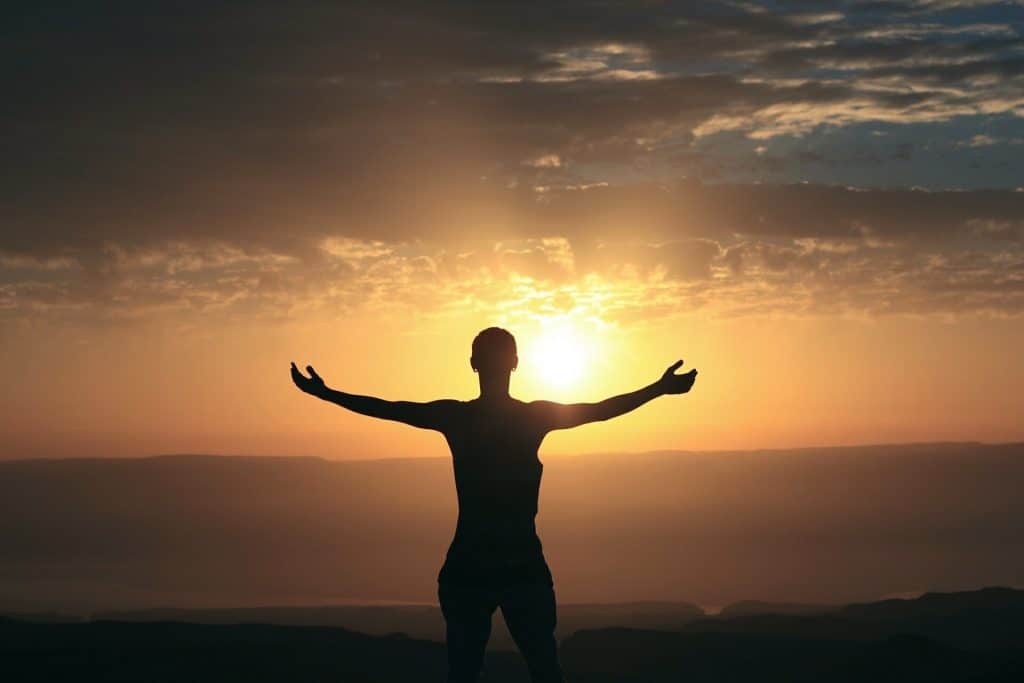
Well, I take Propecia every day and I’ve been taking it since 2010 religiously without missing a day. It probably did affect my testosterone levels negatively, but the fact that I’ve been taking these herbal supplements to boost my testosterone levels, specifically Hypertest and Myodex, I actually had the creator of the supplements, Chris Gatchis, on this podcast, one of my very first episode. I think it’s like number eight or something and his testosterone levels were so low, he couldn’t get his wife pregnant and he went on this whole journey to address that himself. Through his research and everything, he solved that problem. He’s got kids now and he also has a supplement company called Axis Labs and the stuff works.
My testosterone levels have been higher than I’ve ever known them to be, at least from the time that I started measuring it. That’s a win, but yeah, I hear you that Propecia medicine doesn’t come without side effects. All these big pharma drugs have side effects and the cost that comes with it.
That’s great on the testosterone levels. Are you aware of what is considered to be a healthy amount of free testosterone and what’s considered to be an outstanding level for a man?
Why don’t you share that because I think that’s an important data point for our listeners, at least the men, to know who are listening.
They say somewhere in the 400s is about average and 700 is high, 200 is low. If you’re in the 400s, that seems to be okay, pretty good and then 700s and above, you’re very good. There are some people who can be up on the 900s which seems to be outstanding, is that your understanding?
Yep. From memory, I believe I’m in the low 800s, but I’d have to check my test scores, but that’s what I believe it to be the last time I checked.
Have you been using just a testosterone supplement to boost that or have you been doing something else?
Well, I do get some sunlight and I am not religious about my blocking of blue light at night, but I do have Night Shift installed on my phone and on my computer and are enabled. I’m a Mac and iPhone user. I also eat pretty well, so those things probably contribute. The main thing is Hypertest and Myodex. The Hypertest boosts the good testosterone and the Myodex reduces the bad testosterone, the dihydrotestosterone that causes hair loss or what contributes to hair loss.
And it’s from Axis Labs. Is it the Hypertest XTR and the Myodex?
Yes. I take both. It seems to work and I’ve been taking that for eight years now.
Great.
All right, well, let’s go back to sleep for a few minutes and talk about the different types of sleep because we didn’t really address that yet and you can get low quality sleep, which you alluded to, but is the low quality because you’re not getting enough deep sleep, or not enough REM sleep or light sleep? What’re the differences and the repercussions of poor quality in those different areas?
The repercussions are that your body doesn’t work the way that nature intended it to work and when that happens, you’re more likely to be obese, or to be overweight, or to carry additional visceral fat. Poor sleep has been linked to cancer. Obviously, you’re going to be more irritable.
Let me give you a little scenario here for most people. Let’s just say that you think you’re pretty healthy. You go on about life, you’re living your life, you work out a little bit, you eat okay, and you have a glass of wine or two at the end of the night. Sometimes, you go to sleep on time, sometimes you don’t, and you don’t wear a pair of blue light blocking glasses. You sit in bed at night and you scroll through your phone, you watch Netflix, and you go to sleep. You sleep okay and then you get up and you live your life.
Let nature do its course in achieving high-quality sleep — no drugs, no alcohol, just plain and simple natural remedies. Share on XHere’s what’s actually happening with that scenario. You’re not sleeping the way nature intended you to sleep. You wake up just a little bit irritable. Because you’re just a little bit irritable, you’re just a little bit late for work, you’re just a little bit angry at the person who cuts you off in traffic. You’re a little bit late for work and you’re a little bit irritable, you’re feeling a little bit slow, and you’re not as energetic the way that you should be because you haven’t had a great night sleep. You’re like, “Oh, I think I better have a sugary substance mid-morning just to give me a shot that will boost me up,” so you order a Gatorade, or a KitKat, or a muffin, or something with a little bit of sugar in it.
“There’s nothing to harm, it’s just a little sugary food,” which of course spikes your insulin and then 20 minutes later, you have an energy crash. Then you just can’t wait for lunch. Then you get to lunch and at lunchtime, you have your lunch and you try to be healthy. You got your lean meats and vegetables, and that’s good. That’s great. Then afternoon comes and you’re like, “Geeze, I could do a little pick me up,” so you have a little KitKat, or Gatorade, or coffee with two sugars and some cream in it, or whatever it is just for a little pick me up.
Now all of a sudden, you’re putting in more dead calories, you’re putting on more weight, now you’re setting yourself up for another crash, and then the end of the day comes, and you can’t wait to get home to pour yourself a glass of wine to relax, because you’re so tired and stressed from the day at work. You just pour yourself a seemingly innocent glass of wine. You have this seemingly innocent glass of wine and then you have your dinner. Then you go to sleep.
You don’t sleep the way that nature intended you to sleep. You don’t spend time in that deep REM space which really repairs your body, and then you wake up again in the morning. Even after seven or eight hours of sleep, you still wake up in the morning just a little bit irritable again. Then the day continues.
This is what happens for most people in the world. It’s not like you’re going to hit rock bottom with your sleep. It’s not like you sleep horribly, but you’re sleeping so just poorly enough that you’re putting on weight, you’re snapping at your husband, or wife, or your kids, you’re late for work, your job performance is being compromised, you’re not starting that business, you’re not making as much money as you can, and the whole cycle continues.
That’s what’s really happening. We can talk all day and night about what’s going on and what’s happening in REM sleep and everything, but at the end of the day, it’s your life, and you’re compromising it every single time. You don’t focus on sleep quality.
You mentioned visceral fat specifically, that’s really bad. That type of fat wraps around your organs. It is highly correlated with heart disease, and heart attacks, and so forth. What more do you want to say about visceral fat specifically?
Well, we tie it back to sleep and alcohol. A poor night’s sleep is going to hold your body back from burning away that visceral fat. You obviously know it’s bad for you. It’s that stubborn belly fat that you can’t get rid of. If you’re not sleeping the way that you’re supposed to sleep, your body cannot burn that off effectively. It just can’t. Sleep better, sleep as well as you can, and then all of a sudden that visceral fat starts to just fall away.
People think in order to burn away this visceral fat they’ve got to work out in the gym, they’ve got to do a cleanse, they’ve got to going starve themselves, they’ve got to go on diets the whole time. How about you just eat a nice balanced meal and focus on sleep quality. Watch what happens. It’ll just fall off. Same thing with alcohol. This drink that you think is helping you sleep at night, this glass of wine that helps you fall asleep, it’s dead calories. You’re putting more toxins in. So, that visceral fat isn’t going anywhere. It’s not going anywhere.
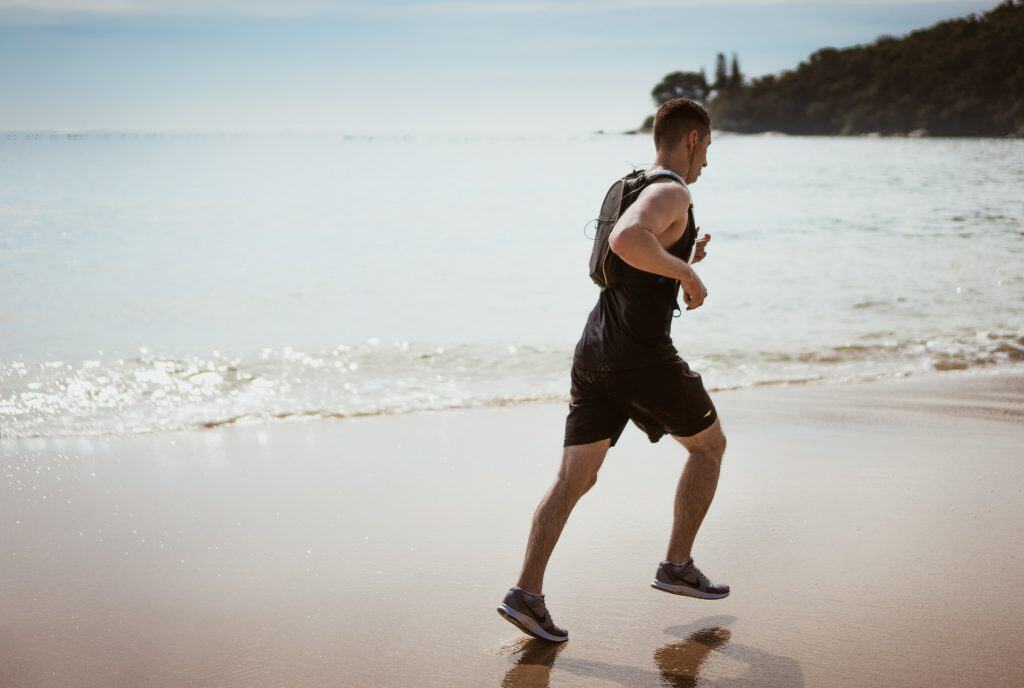
You’ve convinced yourself that this wine helps you relax at the end of the day and helps you fall asleep, but all it’s doing is keeping that visceral fat on. You’re just literally drinking dead calories and that visceral fat will just stay there.
Did you have a problem with visceral fat?
Oh yeah. If you go to 30daynoalcoholchallenge.com which is the name of a program I have, 30daynoalcoholchallenge.com which helps people quit drinking for 30 days straight, it’s an introduction into my methodology for quitting and staying quit. There’s a video on that page. In the very first five seconds, I show a photo of me and the Hollywood actress Jennifer Aniston. It was taken in 2009 just before I quit drinking. I was at the Sundance Film Festival in Park City, Utah and you can have a look at how puffy my face is and how much fat I have in my body there.
I’m barely recognizable from that photo compared to what I look like today and compared to what I look like 30-60 days after that photo was taken quite frankly. But you can see all the fat around my face. I am wearing a sweater so you can’t really see how big my belly is, but you can get an idea of how much visceral fat I had on me as a result of just looking at my face. My face is really puffy, it’s soft, I got a double chin happening. I look completely different and that was the culmination of years of just socially acceptable drinking. Again, I wasn’t doing anything crazy. I was just drinking the way society said it was okay to drink.
How much is that? Like 2-3 drinks every night?
I would say two. I really had more than two, it was probably just a couple of drinks at night.
Was that every night or was it three times a week sort of thing?
Over my lifetime, it certainly wasn’t every night, but I would say probably three times a week. Two drinks, maybe three a few times during the week. It would be rare that I didn’t drink on a Friday night or a Saturday night. There’s always some social engagement going on. I would tend to drink on a Friday night or a Saturday night as my “reward.” That’s how crazy the world is. We think that drinking alcohol is some kind of special occasion to reward ourselves for the end of the week. A few times a week, definitely on weekends. That was probably it, consistently over many years though.
You weren’t a binge drinker, you aren’t getting smashed every weekend sort of thing.
I mean I was certainly in my late teens and early 20s. No question, but then, as I got into my mid-20s, late 20s, and then early 30s, no, I wasn’t really a binge drinker. I was a binge drinker on occasion, but not with great regularity.
Got it. What is the secret sauce to the 30-Day No Alcohol Challenge that makes it work where somebody might have tried to quit in the past and it didn’t work for them?
Well, it’s a fun community. I show you how to quit in a fun way. I differ from an AA (Alcoholics Anonymous). An AA, by the way, only has an 8% success rate, which is their dirty little secret that no one really knows, but if you google AA actual success rate, you’ll find that it fails 95% of people more or less. Also, AA is too extreme. I was never an alcoholic and so I didn’t want to go to an AA meeting and say, “Hi, my name’s James and I’m an alcoholic,” because that would be lying because I was not one and I am not one.
There's a huge difference between sleep quality and duration. You can sleep eight hours a day, but it's not high quality if REM sleep isn't achieved. Share on XIn that particular program and also in other places that teach you how to quit drinking or help you navigate that, you have to really identify as being not a victim, but you have to concede that alcohol has a higher power over you. It keeps you stuck in victim mentality, whereas my 30-day no alcohol challenges is more of a fun exercise where you can do it with some friends, you can do it in a like-minded community. I come up with ways to have fun without drinking. Come up with some really fun alcohol-free drinks. I show you how to rewire your brain, so instead of you looking forward to a glass of wine at the end of the night, you’re looking forward to just relaxing without drinking that glass of wine.
I show you how to have alcohol-free dates if you’re single or even if you’re in a romantic relationship. It’s just fun. It’s a really fun community. It’s helped tens of thousands of people now. Go for at least 30 days straight without drinking in many of them have stayed quit ongoing. You don’t have to, you can just get the 30 days and reassess. I’ll help you get through 30 days alcohol-free and then from there, you can make your own choice. I send you a daily video every day with a little video with a tip on how to how to stay quit that day and just really lovingly and supportively hold your hand through 30 days without drinking.
This reminds me a bit of, I think Tim Ferriss had a challenge, a 30-day challenge of NOBNOM. No Booze No Masturbating for 30 days. Are you familiar with his challenge?
No.
Anyways, I’ve had Tim on the podcast, but it was a long time ago and that was before this challenge. We were just talking about things like outsourcing, delegating, the low information diet, and that sort of stuff. That’s really great that you’re helping people to get off the alcohol, because that really is toxic in multiple ways. I’m curious back to sleep and hacking your sleep, improving your sleep, improving your performance, do you measure the quality of your sleep using something like an aura ring or any kind of apps or devices?
I have done it. I don’t do it now because I’ve kind of got it to a point now where I got it dialed in, but yeah, I used to wear an aura ring in the beginning just to track my sleep quality. I reluctantly did not wear my Swannies blue light blocking glasses for a week just to test and I made it my sleep quality and then I put them back on for a week and use them for a week. I tested the results and then took them off again reluctantly. I saw a noticeable improvement in my sleep quality as a result of just wearing those Swannies glasses in the last half hour before sleep.
Just to be clear, you don’t wear them to sleep, you do remove them before you go to sleep. Some people ask me about that. I use the aura ring to track. Once upon a time, I put the phone underneath the mattress and it measured my movements throughout the night and it told me how much I moved in the morning after. Since then, I don’t really track it because I don’t drink, I wear my glasses, I sleep in a cool environment, I exercise in the morning, I do all the things I know I’m supposed to.
When I wake up in the morning, I feel great. I just keep saying it. I feel the way that I’m sure nature always intended me to feel. It’s not like I’m springing out of bed singing, “Zippity doo dah, zippity day, my-my what a wonderful day.” It’s not like, “Ah, my life is so freaking amazing because I slept great.” No. I’m just waking up and I’m like, “Oh okay, it’s time to get up,” and I get up and I go about my day.
You don’t keep hitting the snooze button.
No, I do not. Never ever. If you are hitting the snooze button, you are just destroying your energy levels, clarity, and focus throughout the day. That is the worst thing you can do. You’re destroying your sleep because you’re telling your body essentially, “It’s okay to sleep and then go back to sleep and sleep, and get back to sleep and sleep.” No, it’s not. Just sleep right through, get up, and feel good.
I also think mentally, it destroys your discipline and sense of mastery over your own biology.
You’re essentially cutting corners or compromising yourself from the very first moment that you wake up and that has a spinoff effect throughout the day. There’s a very famous YouTube video of a former navy seal who was giving a speech at the University of Texas graduation party and he said, “The best thing you can do first thing in the morning is make your bed,” and people started laughing in the audience initially until they realized that he was serious and he said, “No, I’m serious. Make your bed,” and he went on to explain that making your bed gives you that first win of the day, that first victory, and that visual cue of seeing the made bed. The first thing in the morning has this spinoff effect of you winning at little things throughout the course of the day which, over time, leads up to big wins and creates big successes. First thing in the morning, stop compromising your life. Get up when your alarm goes off, don’t hit the snooze button, make your bed, start your day, celebrate those wins, and then those wins will continue throughout the day.
Sleep is critical for high performance, but it tends to be the first thing we neglect when we're busy. Share on XI love it. I also loved your idea of doing a week on and a week off of wearing the blue light blocking glasses 30 minutes before going to sleep, because then you get this realtime feedback that what you’re doing is really making a difference. I’m going to do that because I am not that disciplined about wearing my glasses and I’m going to try it for a week and see what it does to my numbers because I do wear an aura ring all the time.
Great. We actually did a quite costly independent study where we actually tested a number of people doing this and if you want to see the results, you can go to swanwicksleep.com/study and you can see we did an independent study of a group of people who did exactly what I just described. They didn’t wear the Swannies, they wore the Swannies, they didn’t wear the Swannies and what the results were, they came back with that people fell asleep 7 minutes faster, they slept 11 minutes longer than usual, and that 80% reported noticeable improvements in how they felt in the morning, as a result, wearing the Swannies. If you want to check that out, just go to that URL.
Very cool. All right. Let’s talk a bit about meditation. Where does this fit into your life and where should it fit in into our listeners
Well, full disclosure, I am not the world’s greatest regular meditator. I do it sometimes, but I don’t do it regularly. I haven’t yet mastered the art of regular meditation. However, all of the science and all the studies show that if you can regularly meditate, you’re calmer, more relaxed, and therefore you sleep better. You’re just a more agreeable type of person. My form of meditation is I do this thing that I call the daily 20. The daily 20 for me is, within 30 minutes of waking up and exposing myself to sunlight, I will write down 20 things that I am grateful for.
I call it the daily 20. People say, “Twenty? You write down 20 things you’re grateful for every day?” and I say, “Yes, I do,” and the reason I make it 20 rather than 3 or 5 is because I want to activate this thing in my brain called your RAS which stands for Reticular Activating System. If I am finding it challenging to come up with 20 things to be grateful for, I’m happy because now, my mind is searching for things in my life to be grateful for and to be happy about, and because of that, my RAS kicks in which means throughout the day, I will automatically see things, will see evidence that life is good, and that life is working in my favor.
That is my meditation. My form of meditation is being happy, and seeing the good in everything, and doing that daily 20 each morning which takes me about 7-10 minutes each morning, is my regular practice to ensure that I reduce my stress and anxiety levels, and more than that, that I see the good in all situations in life.
Very nice. Do you keep a gratitude journal?
Yeah.
How does that work? It is it like a notebook or something?
It’s just a notebook. I’m looking at four of them from my table right now. I’ve got brown, white, gray, and red one. Every day I open it up and I start by doing 1, 2, 3, 4, 5, all the way down to 20 and then I begin. It’s just become part of my daily routine.
Are these different every day or do you keep putting some of the same ones down over and over again?
I get that question all the time. It’s so interesting. They’re almost always different and people think wow, “Wow, it can’t be. How can that be so?” but it really because so many things happen in a day. It’s like, “I’m grateful for the dinner I had with my friend last night. I’m grateful for the walk in the sun. I’m grateful that this time of the year is so beautiful. I’m grateful for the healthy food that I ate today. I’m grateful for my friend phoning me proactively. I’m grateful for the help I was able to give. I’m grateful for my business of being able to help people quit drinking. I’m grateful for my business that helps sleep. I’m grateful that someone interviewed me on their part podcast today, that I was able to coach people and help people.” It could just change every day.
Pretty cool. I will always have on my list, I think, if I were to do this, I’m grateful for my wife, Orion, because she is the biggest gift in my life. One thing we do before we go to sleep, ever since I interviewed Harville Hendrix on this podcast. He is the creator of the Imago Couples Therapy Methodology system that this spread throughout the world. He does a daily appreciation. Three things that he appreciates about his wife and she does the same with him every single night before they go to sleep. They haven’t missed one day in 18 years.
I was so floored by that and so we started doing that every night pretty much, but we do sometimes miss it so we might miss out of a year, two weeks. Out of the 52 weeks, I think that’s still pretty good. It’s not 100%, I’m not at Harville’s level, but I was so inspired by that and so was my wife, and it makes a difference, it really does. Just like the gratitude journal makes such a difference for you and for other people who implement it I’m sure. This little thing that might take two minutes just completely transforms your relationship. It’s amazing.
It gets you out of expectation and gets you into appreciation. You live a life of appreciation rather than expectation and it’s amazing how your sleep quality improves, your health improves, and your relationships improve. It’s all one beautiful cycle.
It’s kind of a self-fulfilling prophecy. You see the glass half full and then everything seems to line up for you. The universe goes out of its way to help you out. I’m curious about your podcast. I know we’re getting close to time here so I just want to spend a few minutes understanding what motivates you to do your podcast, The James Swanwick Show and what’s different about that podcast versus other ones.
Well, just to be clear, I’ve actually had my podcast on a temporary hiatus for the past 12 months or so actually.
Oh, okay.
You can find all of those episodes that I did up until then there over at the James Swanwick Show. The show actually began at a different phase in my life. I named it The Alpha Male Club in the beginning. It was all aimed at men and then I quickly became bored with just talking about men and men’s issues after a while. I renamed it The James Swanwick Show. I just interviewed people that I was interested in and topics like health and relationships. I used to be a celebrity journalist, I used to interview movie stars like Tom Cruise, Brad Pitt, Angelina Jolie, Hugh Hefner in the Playboy Mansion. Later on, when I was at SportsCenter on ESPN, I interviewed job at Tom Brady, and Magic Johnson, David Beckham, and all these people.
Sometimes I’d put some of those interviews up on the podcast, which was kind of cool. Other times, I would just talk about my own musings of life and talk about health and fitness. It’s wonderful. My interest really is in health and growth-minded things. I like going to conferences. I like health. I like anything that helps me live an optimized life.
Very cool. Do you go to the Upgrade Labs Conference? What used to be called the Bulletproof Biohacking Conference?
In fact, Swannies glasses exhibited there one year and my brother is my business partner in this Swanwick Sleep. We had a booth there. Blue light blocking glasses hit the market very quickly and we sold out after our first three days and we quickly had to get an overnight shipment there. By the end of day two and all of day three, it was remarkable to see hundreds and hundreds of people walking around the Pasadena Convention Center wearing Swannies blue light blocking glasses. It was just remarkable. It was crazy. I spoke on stage with Dave Asprey at Paleo f(x) in Austin earlier this year and he was wearing his blue light blocking glasses and I was wearing mine which was quite funny.
Nice. That’s a great conference. I really enjoy it. I missed this one. I was actually in Australia where you’re at right now speaking at another conference, otherwise, I would have been at Dave’s conference, but my wife and I went to the previous years and the previous years before that. We love to that conference. It’s great.
If there were some little nuggets that you could share with our listeners that you haven’t already shared, what would it be?
Not so much health-related although it can be. There are two mottos that I live by and that is just do it and do it now. Just do it is self-explanatory. It’s obvious and everyone knows they should just do it like, “What do you want to do? Okay. Just go and do it. What do you want to achieve in life? Just go and do it.” But the do it now is a little bit different because most people will say, “All right, I will do it,” and then they don’t put in a calendar, they don’t put a deadline, they just say they’re going to do it. Invariably, what happens is nothing gets done or nothing happens.
For me, whether it’s your health, it’s around quitting drinking for 30 days, it’s around your sleep, getting yourself a pair of blue light blocking glasses, or ensuring that you sleep in a cool room, or doing morning exercises instead of nightly exercise, just do it, and do it now, as in right now. Take action. You’re listening to this right now on the podcast or whenever you’re listening to it, just take an action to fix your sleep, or to reduce your alcohol, or to quit alcohol, to whatever it is, just do it and do it now. I’m in my forties and father time remains undefeated. It’s just going tik-tok, tik-tok, tik-tok. It goes fast, so just do it and do it now.
Great advice. If not now, then when? If not you, then who?
I like it.
If folks wanted to buy a pair of Swannies, do you have a discount code they could use? Actually I think your assistant sent me a discount code, SPENCER I think is the code.
Yeah. If you go to swanwicksleep.com and choose which style of glasses you want, we have stylish pairs for men and women, we’ve got kids glasses. If you have kids who are staring into iPads, or playing video games, and you want to protect their eyes, you can buy kids range. We’ve some eye masks and things there. Just go to the checkout and type in SPENCER at the end and that’ll give you the discount.
That’s 10%, right?
I believe so.
Cool. All right. Well, thank you so much, James. This was a lot of fun, and very educational, empowering, and life-extending for those who actually implement it. Thank you again, James.
Well, thank you so much for having me, Stephan. I appreciate it.
All right. Listeners, take some action. Pick at least two things from what you’ve learned and implement them right away. Now, not just someday, but today. We’ll catch on the next episode of Get Yourself Optimized. I’m your host, Stephan Spencer signing off.
Want more episodes on sleep hacking? Well, I’ll hook you up. I’ve got episode 58 with sleep Dr. Michael Breus, episode 128 with Luke Storey, and episode 209 with Claus Pummer. And if you want to get really adventurous about your sleep and learn all about lucid dreaming, then you’ll definitely want to check out episode 150 with Charlie Morely.
Links and Resources
Connect with James Swanwick
App/Tool
Book
Businesses/Organizations
People
Previous Get Yourself Optimized Episodes
Find Romance that Stands the Test of Time with Imago Therapy with Harville Hendrix and Helen LaKelly Hunt
Get Better Sleep by Discovering Your Chronotype with Dr. Michael Breus
Finding a Higher Level Consciousness Through Extreme Biohacking and Spirituality, Part 2 of 2 with Luke Storey

